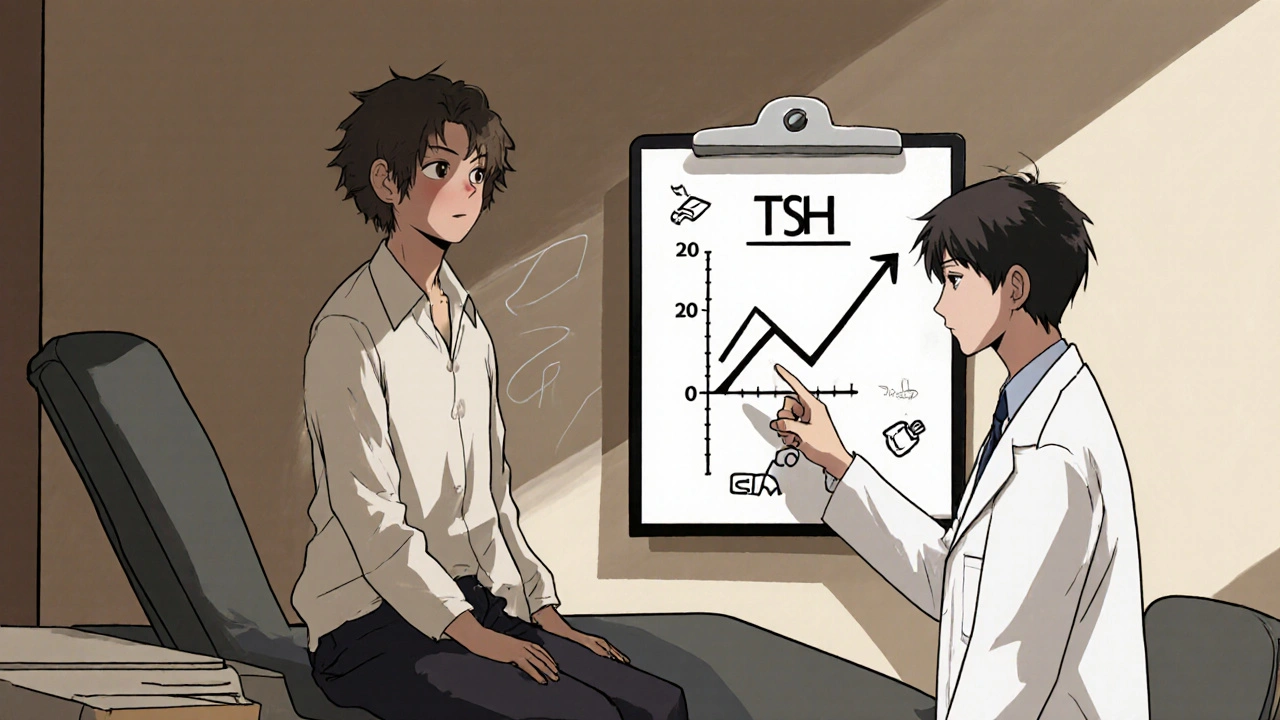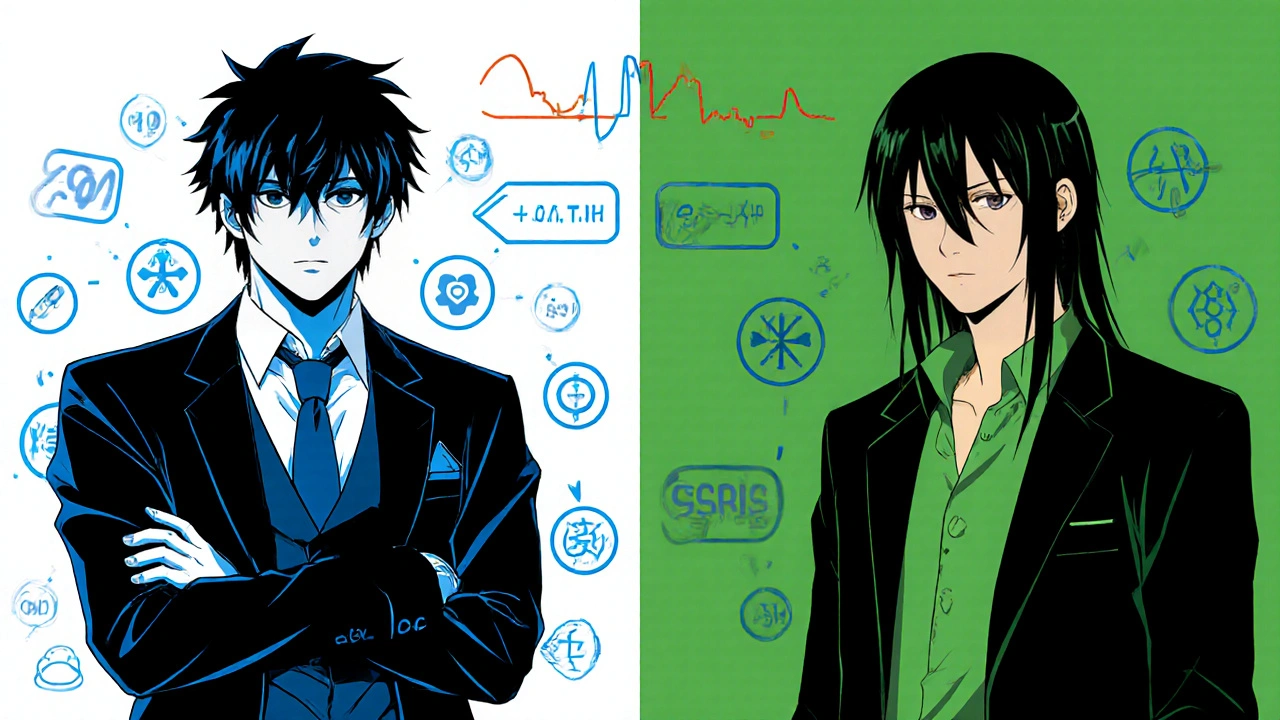Key Takeaways
- Bupropion can subtly influence thyroid‑stimulating hormone (TSH) levels, especially in people with pre‑existing thyroid disease.
- Most changes are mild and reversible once the medication is adjusted or stopped.
- Regular lab monitoring is advised for anyone on bupropion who also takes thyroid medication like levothyroxine.
- Unlike many SSRIs, bupropion’s impact on thyroid hormones is linked to its effect on dopamine and norepinephrine pathways.
- Consult your doctor before combining bupropion with any thyroid‑active drug.
What Is Bupropion?
Bupropion is an atypical antidepressant and smoking‑cessation aid that works primarily by inhibiting the reuptake of dopamine and norepinephrine. It is marketed under brand names like Wellbutrin and Zyban and is approved for major depressive disorder, seasonal affective disorder, and nicotine dependence. Unlike selective serotonin reuptake inhibitors (SSRIs), it has minimal effect on serotonin, which is why it carries a lower risk of sexual side effects and weight gain.
Typical adult doses range from 150 mg daily for smoking cessation up to 450 mg divided into two doses for depression. The drug is metabolized mainly by the liver enzyme CYP2B6, producing an active metabolite, hydroxy‑bupropion, which contributes to its therapeutic effect.
How the Thyroid gland Regulates Metabolism
The thyroid gland sits at the base of the neck and releases two key hormones: thyroxine (T4) and triiodothyronine (T3). These hormones control basal metabolic rate, heart rate, and temperature regulation. The pituitary releases thyroid‑stimulating hormone (TSH) to signal the thyroid when to produce more or less hormone, creating a tight feedback loop.
Disorders fall into two broad categories: hypothyroidism (low hormone output) and hyperthyroidism (excessive output). Levothyroxine, a synthetic form of T4, is the standard treatment for hypothyroidism, while antithyroid drugs or radioactive iodine manage hyperthyroidism.

Does Bupropion Influence Thyroid Hormones?
Clinical observations suggest that bupropion can cause small fluctuations in TSH levels. The mechanism isn’t a direct thyroid‑toxic effect; instead, the drug’s boost of dopamine and norepinephrine can alter the hypothalamic‑pituitary‑thyroid (HPT) axis. Dopamine, for example, can suppress prolactin, and changes in prolactin can indirectly affect TSH secretion.
Most patients experience changes that stay within the laboratory’s normal reference range. However, for individuals already on levothyroxine, a 10‑15 % shift in TSH can tip the balance, prompting a dose adjustment.
What the Research Shows
A 2022 prospective cohort study of 312 patients on bupropion found a mean TSH rise of 0.38 mIU/L after six months, compared with a stable 0.02 mIU/L in a matched SSRI group. The researchers noted that patients with baseline subclinical hypothyroidism were more likely to cross into overt hypothyroidism.
Another small crossover trial (n=48) measured free T4 and free T3 before and after a three‑month bupropion course. Results indicated no significant change in free T4 or T3, supporting the idea that the drug’s primary impact is on TSH regulation rather than hormone synthesis.
Meta‑analysis of five studies (total n≈1,200) concluded that bupropion is associated with a modest, statistically significant increase in TSH (average +0.31 mIU/L) but does not consistently alter T3/T4 levels. The authors emphasized the need for routine thyroid testing in patients with known thyroid disease.
Practical Guidance for Patients and Clinicians
- Baseline testing: Obtain TSH, free T4, and free T3 before starting bupropion, especially if the patient has a history of thyroid disorder.
- Follow‑up schedule: Re‑check thyroid labs at 6‑week and 3‑month intervals after initiation or dosage changes.
- Interpretation: A rise in TSH < 5 mIU/L is usually not alarming, but a trend upward over consecutive tests warrants a levothyroxine dose tweak.
- Medication timing: Take bupropion and levothyroxine at least 30 minutes apart to avoid absorption interference.
- Symptoms monitoring: Watch for fatigue, weight gain, cold intolerance (hypothyroid signs) or anxiety, palpitations (hyperthyroid signs) after starting the drug.

Interaction With Common Thyroid Medications
Levothyroxine remains the cornerstone of hypothyroidism treatment. Because bupropion does not affect gut pH or binding proteins, the primary concern is timing rather than pharmacokinetic competition. However, dopamine’s suppressive effect on TSH can mask under‑replacement, leading clinicians to think the dose is sufficient when the patient may still be slightly under‑treated.
For patients on liothyronine (synthetic T3) or combination T4/T3 therapy, the impact is similar-TSH may rise, but free T3 typically stays stable. No dose‑adjustment guidelines exist specifically for bupropion, so clinicians rely on standard TSH‑targeted titration.
Comparison: Bupropion vs SSRIs on Thyroid Function
| Drug class | Primary neurochemical effect | Typical impact on TSH | Impact on free T4 / T3 | Clinical note |
|---|---|---|---|---|
| Bupropion | Dopamine & norepinephrine reuptake inhibition | ↑ modest (≈+0.3 mIU/L) | No consistent change | Monitor TSH in patients with thyroid disease |
| SSRIs (e.g., sertraline) | Serotonin reuptake inhibition | ↔ generally stable | Rare slight ↓ free T4 | Less concern for thyroid interaction |
Frequently Asked Questions
Can bupropion cause overt hypothyroidism?
It rarely pushes a patient into overt hypothyroidism on its own. The risk is higher in people who already have subclinical hypothyroidism or are on a tight levothyroxine regimen. Regular TSH checks catch any drift early.
Should I stop levothyroxine if my TSH rises while on bupropion?
No. A rise in TSH usually signals that your thyroid dose may need a small increase, not a cessation. Discuss any lab changes with your endocrinologist before adjusting medication.
Is the bupropion thyroid interaction a reason to avoid the drug?
Not in most cases. The interaction is mild and manageable with monitoring. If you have uncontrolled thyroid disease, your doctor might choose an alternative antidepressant.
Do other antidepressants affect thyroid function?
SSRIs and SNRIs generally have little impact on TSH, though isolated case reports link some to modest T4 reductions. Tricyclic antidepressants can affect thyroid binding proteins, but the clinical relevance is low.
What symptoms should prompt an urgent lab check?
Sudden fatigue, unexplained weight gain, hair loss, cold intolerance, or rapid heart rate should trigger a prompt TSH and free hormone test, especially within the first few months of therapy.


Rakhi Kasana
October 19 2025While the headline may sound alarming, the reality is that bupropine's impact on thyroid function is usually modest. The drug’s dopaminergic and noradrenergic activity can nudge the hypothalamic‑pituitary‑thyroid axis, leading to a small rise in TSH. For most patients that shift stays well within the normal laboratory range and corrects once the dose is tweaked. However, if you already have subclinical hypothyroidism, even a slight increase can tip you into overt hypothyroidism. Regular monitoring, especially after dose changes, is the safest way to avoid surprises.